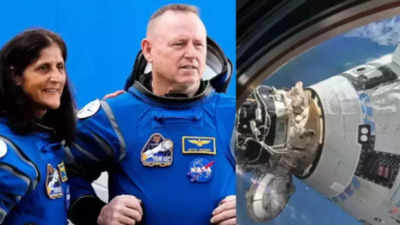- News
- Science News
- "I've been trying to remember what it's like to walk...": Sunita Williams struggles to walk after 7 months in space; here’s what it means for astronauts
"I've been trying to remember what it's like to walk...": Sunita Williams struggles to walk after 7 months in space; here’s what it means for astronauts
After seven months on the ISS, astronaut Sunita Williams has forgotten how to walk due to extended weightlessness. Originally a short mission, delays stretched her stay, impacting her physically and emotionally as she maintains family connections. This raises concerns about long-term space travel's effects and challenges in ensuring crew safety and rotations.
After an extraordinary seven-month mission aboard the International Space Station, astronaut Sunita Williams faced a startling challenge—she had lost the ability to walk. This unexpected consequence has sparked intense debate about the long-term physical toll of extended space travel on astronauts.
As space agencies push forward with ambitious plans to explore Mars and beyond, Williams’s condition forces a critical reassessment of the risks involved. If something as fundamental as walking can be compromised, what other unforeseen challenges might future astronauts encounter, especially in prolonged missions? Her ordeal underscores the urgent need for advancements in space medicine, rehabilitation techniques, and technology. With the future of human space exploration hanging in the balance, Williams’s experience raises crucial questions about how humanity will adapt to life beyond Earth, ensuring the survival and health of astronauts in deep space.
Sunita Williams forgets how to walk after 7 months in space and it's raising serious questions
Astronaut Sunita Williams, who has spent the last seven months aboard the International Space Station, has revealed an astonishing challenge: she's forgotten what it's like to walk. Recently, in a conversation with students, Williams confessed that she had been up there long enough at the moment that she was trying to remember what it felt like to walk. After months spent floating in zero gravity, Williams has neither sat down nor laid down, and now, she is struggling to reconnect with the sensation of walking on solid ground. What was supposed to be a short-duration mission aboard the Starliner spacecraft turned into a long, drawn-out experience.
Elon Musk joins Trump's mission to save 'abandoned' space heroes
“They've been waiting for months, virtually abandoned in space," Trump said, criticizing President Biden's handling of the situation. "Elon will soon be on his way. Hopefully, all will be safe."
Musk, known for his ambitious space ventures, confirmed that SpaceX would take on the mission, expressing disbelief over what he called a “terrible” failure to prioritize the astronauts' safe return. "We’ll bring them home as soon as possible," Musk assured.
Critics said that all this was mere politics, where White House sources denied any neglect of astronauts currently aboard the ISS. However, Trump's bold statement has reignited public debate over the government's role in space exploration and astronaut safety.
How Sunita Williams keeps her family close despite her extended time in space
The unscheduled extensions to her voyage in space aside, astronaut Sunita Williams is making most of her presence there. Gorging from every opportunity in terms of taking people on an astronomical journey onboard with Earth on their planet earth, the same extensions have left the astronaut fighting the personal losses caused by prolongation.
Astronaut Sunita Williams confesses that family bonding has borne a lot regarding this, specially between her mom. "I talk to my mom practically every day just to check in and keep that connection alive," Williams shared. What was meant to be a short mission has now become a test of endurance—not only for her physical strength but for her emotional resilience. How has the balance of deep space exploration and family life affected Williams, and what does this mean for astronauts who may face similar personal sacrifices in the future?
Sunita Williams and Butch Wilmore forced to stay on ISS as SpaceX Crew-10 launch delayed
Astronauts Sunita Williams and Butch Wilmore have been left stranded at the International Space Station (ISS) for seven months after being initially scheduled to come back to Earth in February as part of the SpaceX Crew-9 Dragon. The delays stemmed from major safety concerns associated with the Starliner spacecraft. NASA carefully evaluated their situation.
The replacement astronauts, who were originally due to arrive earlier, will now be launched on SpaceX Crew-10 in late March or April. Until that time, Williams and Wilmore will have to stay on the ISS to allow for a smooth handover of operations. The unexpected extension once again shows how complicated space travel is and highlights the continued difficulties of ensuring safe and efficient crew rotation in this constantly changing landscape of space exploration.
Also Read: Scientists discover two mountains taller than Everest hidden deep within Earth
End of Article
FOLLOW US ON SOCIAL MEDIA


